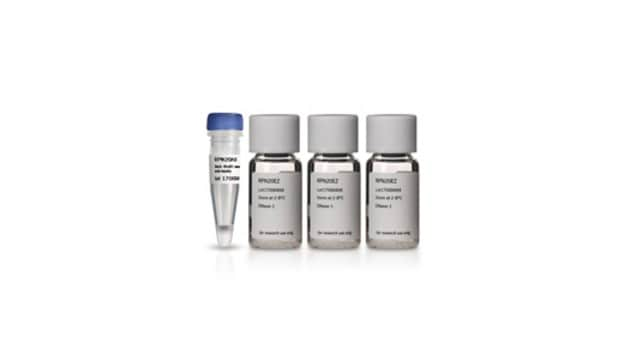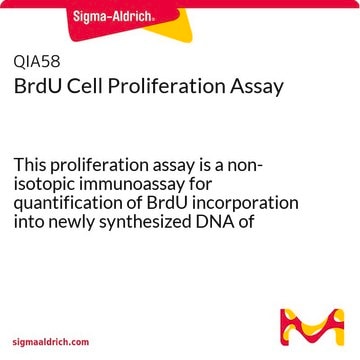05-633
Anti-BrdU Antibody, clone BU-1
culture supernatant, clone BU-1, Upstate®
Synonym(s):
Anti-BrdU antibody
Sign Into View Organizational & Contract Pricing
All Photos(1)
About This Item
UNSPSC Code:
12352203
eCl@ss:
32160702
NACRES:
NA.41
Recommended Products
biological source
mouse
Quality Level
antibody form
culture supernatant
antibody product type
primary antibodies
clone
BU-1, monoclonal
species reactivity (predicted by homology)
all
manufacturer/tradename
Upstate®
technique(s)
immunocytochemistry: suitable
isotype
IgG2a
shipped in
wet ice
target post-translational modification
unmodified
General description
The immunocytochemical detection of bromodeoxyuridine (BrdU) incorporated into DNA is a powerful tool to study the cytokinetics of normal and neoplastic cells. In vitro or in vivo labeling of tumor cells with the thymidine analogue BrdU and the subsequent detection of incorporated BrdU with specific anti-BrdU monoclonal antibodies is an accurate and comprehensive method to quantitate the degree of DNA-synthesis. BrdU is incorporated into the newly synthezised DNA of the S-phase cells and can thus provide an estimate for the fraction of cells in S-phase. Also dynamic proliferative information (such as the S-phase transit rate and the potential doubling time) can be obtained, by means of bivariate BrdU/DNA flow cytometric analysis.
Specificity
5-Bromo-2-deoxyuridine
Immunogen
5-iodouridine:ovalbumin conjugate
Application
Detect BrdU also known as Bromodeoxyuridine with Anti-BrdU Antibody, clone BU-1 (Mouse Monoclonal Antibody), that has been demonstrated to work in ICC.
Quality
A representative lot was evaluated by immunocytochemistry on HeLa cells. A 1:2-1:4 dilution from a representative lot showed positive immunostaining for Anti-BrdU in HeLa cells fixed with 95% ethanol, 5% glacial acetic acid. This lot was tested using the DNA Replication Assay Kit (Catalog # 17-316).
Technical Tip: This antibody detects 5-Bromo-2- deoxyuridine incorporated into double-stranded DNA. DNA denaturation is not required.
Technical Tip: This antibody detects 5-Bromo-2- deoxyuridine incorporated into double-stranded DNA. DNA denaturation is not required.
Target description
none given
Physical form
4 vials, each vial containing mouse culture supernatant lyophilized from 2.5 mL. The supernatant contains mycoplasma, which contribute enzymes that facilitate antibody binding. Lyophilized powder.
Legal Information
UPSTATE is a registered trademark of Merck KGaA, Darmstadt, Germany
Not finding the right product?
Try our Product Selector Tool.
Storage Class Code
11 - Combustible Solids
WGK
WGK 1
Flash Point(F)
Not applicable
Flash Point(C)
Not applicable
Certificates of Analysis (COA)
Search for Certificates of Analysis (COA) by entering the products Lot/Batch Number. Lot and Batch Numbers can be found on a product’s label following the words ‘Lot’ or ‘Batch’.
Already Own This Product?
Find documentation for the products that you have recently purchased in the Document Library.
S-phase detection with an antibody to bromodeoxyuridine. Role of DNase pretreatment.
Gonchoroff, N J, et al.
Journal of Immunological Methods, 93, 97-101 (1986)
X Gao et al.
Cell death & disease, 6, e1610-e1610 (2015-01-23)
G-quadruplex (G4) DNA and G4 DNA resolvase are involved in a variety of biological processes. To understand the biological function of G4 DNA structures and their resolvases in spermatogenesis, we investigated the distribution of G4 structures in mouse testis and
Chunhua Tang et al.
Journal of molecular cell biology, 11(5), 408-420 (2018-09-15)
DICER1 is a key enzyme responsible for the maturation of microRNAs. Recent evidences suggested that DICER1 and microRNAs expressed in epididymis were involved in the control of male fertility. However, the exact mechanism remains to be elucidated. Here, we created
Macrophages and dendritic cells as actors in the immune reaction of classical Hodgkin lymphoma.
Tudor, CS; Bruns, H; Daniel, C; Distel, LV; Hartmann, A; Gerbitz, A; Buettner, MJ
Testing null
N J Gonchoroff et al.
Cytometry, 6(6), 506-512 (1985-11-01)
We describe a mouse monoclonal antibody (BU-1) reactive with 5-bromo-2-deoxyuridine (BrdUrd). The antibody is different from previously described BrdUrd monoclonal antibodies in that BU-1 does not require pretreatment of cells with strong DNA denaturants in order for the antibody to
Our team of scientists has experience in all areas of research including Life Science, Material Science, Chemical Synthesis, Chromatography, Analytical and many others.
Contact Technical Service






